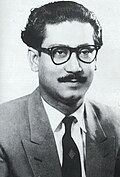Description
The documentary reveals how one of the assassins Noor Chowdhury had fled to Canada now residing in a condo in Etobicoke west of Toronto. It explored the circumstances of the Noor Chowdhury case and included interviews with numerous prominent figures including Prime Minister Sheikh Hasina, the High Commissioner of Bangladesh in Canada Khalilur Rahman, and other individuals involved in the case. According to the documentary, Chowdhury is currently the most wanted criminal in Bangladesh. He was convicted in absentia and sentenced to death for assassinating the country's then president, Sheikh Mujibur Rahman, in 1975, and helping to plan the massacre of 21 members of the president's family and household, including his 10-year-old son. [8] He was filmed tending to plants on his balcony but fled when confronted by the journalist outside his residence. The Government of Canada including Immigration, Refugees and Citizenship Canada (IRCC) refused to comment on the documentary about the case. Despite a deportation order issued by IRCC in 2006, Canada has been publicly silent on its reasons for allowing him to stay, driving a wedge between the two long-friendly countries. [8] The documentary also shows the friendship between Bangladesh & Canada in the time when Sheikh Mujibur Rahman and Pierre Trudeau were in power. [8]
This page is based on this
Wikipedia article Text is available under the
CC BY-SA 4.0 license; additional terms may apply.
Images, videos and audio are available under their respective licenses.

